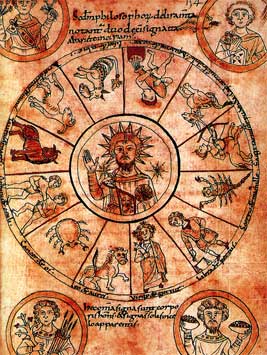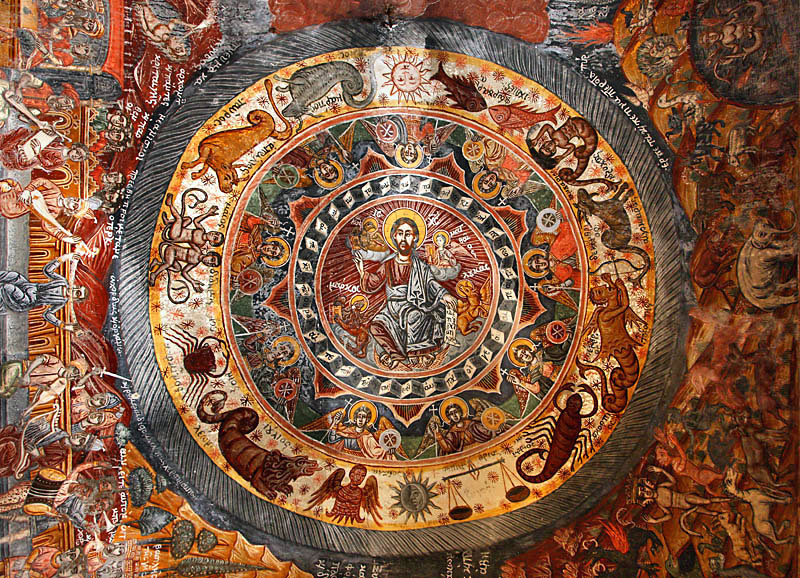http://www.orthodoxartsjournal.org/most-of-the-time-the-earth-is-flat/
I very much agree with the general thrust of his views, right to the Homeric allusion at the end.
Modern cosmology is indeed useful for sending up satellites and flying space ships, for sending a few people to colonize Mars. And even during the Middle Ages scholars believed the Earth to be a sphere. Multiple cosmologies should be able to coexist and play different functions, some more philosophical and human and others more technical and mathematical. But in our lives most of the time, the Earth is flat. Most of the time, the sky is up and the Earth is down, most of the time means in those instances when I am interacting with my family, my society and my enemies. And most of all, if we wish to understand religion and its symbolism, if we wish to understand the Bible or icons or church architecture we must anchor ourselves to the world of human experience, for that is where we can love our neighbour. We must force ourselves to believe that the sun rises every morning, or that the moon waxes and wanes and honestly it should not be so difficult, because despite Galileo and Newton and Einstein Im pretty sure I will find some joy in tomorrows rosy fingered dawn
Reading the article, I got the impression that his general thrust was on retreating from scientific discovery when it seems that it leads to a devaluing of understanding/appreciating the simple things in life that the medieval and Early Church world valued. Not everything that we see in the world of science today as being "inaccurate" (i.e. the world being round rather than flat as a quick example) led to a negative
since quality was seen as the focus more so than accuracy for its own sake (as Fr. Michael P. Plekon of the Orthodox Church of America noted best). As discussed in the Evolution thread ( in
#469 and
#481 ,
#478 ) Thinking the Earth was flat because the Sun rose horizontally (from their perspective) did not change the fact that they appreciated the value of the Sun and who Made it (God) - whereas later generations used valid beliefs on accuracy done by believers (Galileo in example) during the Enlightenment Age to say "If this view was true that Christians and others had, then EVERYTHING supernatural is false."
Their viewing the Earth as flat didn't change the fact that they had a much greater sense of AWE and AMAZEMENT thinking the Sun was going to come up every day and there was something mysterious with not knowing where the sun went after it went down. Families were connected together even when it seemed their knowledge was not as complete as we have it today - whereas modernity and the Age of Reason assumed that Human Reason alone is what could give life meaning.......and thus, there was no longer simplicity.
Considering these fathers of the Scientific Revolution:
Andreas Vesalius (1514-1564) Father of modern anatomy
Galileo Galilei (1564-1642) Father of modern astronomy
William Harvey (1578-1630) Father of modern medicine
Robert Boyle (1627-1691) Father of modern chemistry
Antony van Leeuwenhoek (1632-1723) Father of microbiology
Isaac Newton (1642-1727) Father of modern mechanistic physics (and, with Leibnitz, of calculus).
Within the realm of the science of music, the same has been seen. For example, in 1616, astronomer Johannes Kepler pursued a longstanding interest in music in an unusual direction. He developed a system of musical notation to represent the variations in the speed of each planet when nearest to and furthest from the sun. The harmonies produced by the planets notes, he felt, proclaimed the glory of God. He used just two notes to represent the relatively small change in the earths speed, lamenting, The Earth sings Mi-Fa-Mi, so we can gather even from this that Misery and Famine reign on our habitat. He published this research as Harmonies of the World (1618). Seemingly a quirky diversion, these musical investigations led Kepler to the discovery of the principles of planetary motion, which, 40 years later, would spur Isaac Newton to develop his theory of universal gravitation.
Science was never meant to be concieved as the enemy of religion - or as the enemy of simplicity and enjoyment or automatically ruling out the supernatural - as even within church history, other believers stated outright how science should be welcomed when it comes to showing the artistic/delicate design that the universe has been given to keep going.
And even as they sought to understand the world, they did not lose their sense of awe for the Lord or value of family/relationships - and they also did not assume they were ever able to know everything. Even they still looked UP to the Heavens knowing they couldn't see or know everything there was to know in existence.
As an aside, the background behind how things went when they viewed the sun is fascinating - the suns visual journey throughout the course of the year signified a universal journey, which has been understood and undertaken by people throughout the world, and throughout timethe journey to enlightenment. And the frescos have been really excellent in making that point - as it concerns examples showing Jesus in the centre of a zodiac as done by certain monasteries.
The heavens do declare the glory of God and There's no reason to assume that the early world was "primitive" or "off" simply because of the fact that they held to views supporting a lot with astrology (seen as a science..from studying dreams to constellations, etc.) - including others such as Daniel (Daniel 2:27-28) and the Wisemen (more in
MYSTAGOGY: The Magi and the Star: An Orthodox Understanding ...even though the Lord did note that people were not to look to the stars rather than Him, per Jeremiah 10:2-3 and Deuteronomy 4:19 and Acts 7:42-43) - and likewise, there's no reason to do the same with the Early Church or world before the era where Science sought to disprove God alongside all other forms of spiritual/supernatural thought.
As C.S Lewis said, "Men became scientific because they expected law in nature and they expected law in nature because they believed in a lawgiver." Galileo (1564-1642), Kelper (1571-1630), Pascal (1623-1662), Boyle (1627-1691), Newton (1642-1727), Faraday (1791-1867), Babbage (1792-1871), Mendel (1822-1884), Pasteur (1822-1895), Kelvin (1824-1907), and Clerk-Maxwell (1831-1879) were all theists, most of them Christians. Their belief in God, far from being a hindrance to their science, was often the main inspiration for it....for as Johannes Kepler wrote, "The chief aim of all investigations of the external world should be to discover the rational order which has been imposed on it by God, and which he revealed to us in the language of mathematics. " ( Astronomia Nova De Motibus ). The Scientific Revolution was based in Christ - most of the great minds behind it (i.e. Newton, for example) were Christians/believers in God who looked for Divine Laws in nature since they believed in a Divine Law Maker/a Messiah who held it all together. But once the Enlightenment begun, man began to try recognizing the works of God without God (i.e. Methodological Naturalism )and trusted in themselves...with ALOT of advancements being used wrongly.
And that's what led to a lot of problems - not the accuracy of view but the hearts behind it. Some people actually feel that one can believe in what came after the Medieval and Early Church times with simple views in science - and yet not believe the same dynamics they did. It'd not take believing the Earth is Flat in order to believe that what we experience with one another horizontally is truly impactful - that we still look up at the stars and the sun when it rises and when it sets.....and it still keeps us grounded in how much we have to be thankful for.
As an aside, I saw the pictures in the article you sent with the Zodiac and Christ. I am glad for the enumeration on the creatures of the zodiac that St. John of Damascus was not fearful of in his text, On the Orthodox Faith. (
here and
here) - as he noted in
The Exact Exposition of the Orthodox Faith, Book II, Chap. Vii:
"Now the Greeks (the pagans) declare that all our affairs are controlled by the rising and setting and collision of the stars, the sun and moon (and the signs of the zodiac); for it is with these matters that astrology has to do. But we hold that we get from them signs of rain and drought, cold and heat, moisture and dryness, and of various winds, and so forth, but no sign whatsoever as to our actions. For we have been created with free will by our Creator and we are masters over our own actions. Indeed, if all our actions depend on the course of the stars, all we do is done out of necessity (fate, in other words); and necessity precludes either virtue or vice. But if we possess neither virtue nor vice, we deserve neither praise nor punishment, and God too, will turn out to be unjust, since He gives good things to some land afflicts others. In fact, He will no longer guide or provide for His own creatures, if all things are carried and swept along in the grip of necessity. And the faculty of reason will be superfluous for us, for if we are not masters of any of our actions, deliberation is quite superfluous. Reason, indeed, is granted to us solely that we might take counsel, and therefore all reason implies freedom of will."

 I often think even the average newspaper reader doesn't know much about newsmen or commentators or the "experts." They read some pieces, react, turn the page, forget. I think the average American has always reacted more to pop culture than to the intelligentsia of its time. I know that sounds cynical. Americans have always reacted well to propaganda and gossip in politics more than hard analysis and insightful debate. What got more traction--allegations that President Jackson cheated on his wife or the "Coffin Handbill" was legit OR actual speeches by President Jackson? How many people read much less cared about his debates or speeches. They read posters, heard rhetoric, got partisan, like they do now. "Tippecanoe and Tyler too" jingles or "loose lips sink ships" in WWII are the usual extent of American grappling with issues. Those things endure in people's minds, not philosophers or much depth if you ask me.
I often think even the average newspaper reader doesn't know much about newsmen or commentators or the "experts." They read some pieces, react, turn the page, forget. I think the average American has always reacted more to pop culture than to the intelligentsia of its time. I know that sounds cynical. Americans have always reacted well to propaganda and gossip in politics more than hard analysis and insightful debate. What got more traction--allegations that President Jackson cheated on his wife or the "Coffin Handbill" was legit OR actual speeches by President Jackson? How many people read much less cared about his debates or speeches. They read posters, heard rhetoric, got partisan, like they do now. "Tippecanoe and Tyler too" jingles or "loose lips sink ships" in WWII are the usual extent of American grappling with issues. Those things endure in people's minds, not philosophers or much depth if you ask me. 
